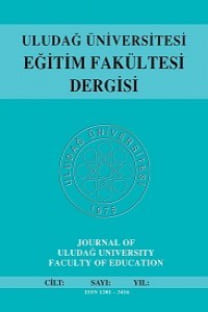Doğrusal İlişki Bilgisini Oluşturma Süreci Üzerinde Bir Durum Çalışması
Son yıllarda öğrenme ortamı düzenlemede, bilişsel süreçlerle ilgili gelişmelerin ciddi etkileri olmuştur. Çalışmamızda bu gelişmelerin dikkate alınmasıyla hazırlanmış bir öğrenme ortamında, konu hakkında önöğrenmesi olmayan bir ilköğretim 6. sınıf öğrencisinin doğrusal ilişki bilgisini oluşturma süreci incelenmiştir. Örnek olay yöntemi ile gerçekleştirilen çalışma, gönüllü bir 6. sınıf öğrencisiyle yürütülmüş, çalışmada öğrencinin ön deneyim ve bilgilerini azami ölçüde kullanabilmesine imkân veren iki problem kullanılmıştır. Çalışmada öğrencinin ilk problemde oluşturduğu bilgiyi, sonraki problemde kullandığı ve doğrusal ilişki bilgisini belirli bir düzeyde doğru olarak soyutlayabildiği gözlenmiştir. Çalışma, doğrusal ilişkinin öğretiminde çevresel olay ve problemlerin kullanılmasının öğrenmeyi sağladığını ve öğrenmeye olan güçlü katkısını ortaya koymuştur
Anahtar Kelimeler:
-
Doğrusal İlişki Bilgisini Oluşturma Süreci Üzerinde Bir Durum Çalışması
In recent years, developments about cognitive processes have been serious impacts on the arrangements of the learning environments. This study examines the process whereby a sixth grader comes to possess knowledge of linear relationships, in a learning environment arranged with recent developments in mind. The study, which has a case study design, was conducted with the participation of a volunteering sixth grader, and two problems that allowed use of previously acquired knowledge and experience were employed. It was observed that the student used knowledge acquired in the first problem in the solution of subsequent problem, and that she could correctly abstract the knowledge of linear relationships at a certain level. The study finds that use of events and problems in the surrounding environment makes a significant contribution to learning linear relationship conception
Keywords:
-,
___
- Altun, M. 2013. İlköğretim ikinci kademe (5,6,7 ve 8. sınıflarda) matematik öğretimi, 8. Baskı, Bursa: Aktüel Yayıncılık.
- Altun, M. ve Yılmaz, A. 2008. Lise öğrencilerinin tam değer fonksiyonu bilgisini oluşturma süreci, Ankara Üniversitesi Eğitim Bilimleri Fakültesi Dergisi, Cilt 41, Sayı 2
- Bikner –Ahsbahs, A. 2004. Towards the emergence of constructing mathematical meanings. In Proceedings of the 28th Conference of the International Group for the Psychology of Mathematics Education, 2, 119-126.
- De Corte, E. 2004. Mainstreams and perspectives in research on learning mathematics from instruction, Applied Psychology, Vol. 53, 279- 310.
- Dreyfus, T. 2007. Processes of abstraction in context the nested epistemic actions model, Retrieved May 5, 2011 from http://escalate.org.il/construction_knowledge/papers/dreyfus.pdf.
- Hershkowitz, R., Schwarz, B. B. and Dreyfus, T. 2001. Abstraction in contexts: epistemic actions, Journal for Research in Mathematics Education, 32(2), 195-222.
- Hershkowitz, R, Schwarz, B. B., Dreyfus, T. and Hadas, N. 2007. Abstracting processes, from individuals’ constructing of knowledge to a group’s “shared knowledge”, Mathematics Education Research Journal, Vol. 19, No. 2, 41-68.
- Kirk, J. and Miller, M.L. 1986. Reliability and validity in qualitative research. Beverly Hills, CA: SAGE Publications.
- Miles,M.B., and Huberman, M. 1994. Qualitative data analysis: an expaded sourcebook (2. edition). Thousand Oaks, CA: Sage
- Mitchelmore, M. and White, P. (2004). Teaching Mathematical Concepts: Instruction for Abstraction. Invited Regular Lecture Presented at the 10th International Congress on Mathematical Education. Copenhagen, Denmark.
- Monaghan, J. and Özmantar, M. F. 2006. Abstraction and consolidation, Educational Studies in Mathematics,Retrieved: July 13, 2011 fromhttp://www.springerlink.com/content/c134370723467362/fullte xt.pdf
- Özmantar, M. F. and Monaghan, J. 2007. A dialectical approach to the formation of mathematical abstractions, Mathematics Education Research Journal, 19(2), 89–112.
- Russell, B. 1926. Education and good life. NY: Boni and Liveright.
- Schwarz, B.,Dreyfus, T.,Hadas, N. & Hershkowitz, R. 2004. “Teacher Guidance of Knowledge Construction”, Proceedings of the 28th Conference of the International Group for the Psychology of Mathematics Education, eds. M. J. Hoines - A.B. Fuglesad, 4, pp. 169- 176, Bergen University College, Norway.
- Tanışlı, D. 2008. İlköğretim beşinci sınıf öğrencilerinin örüntülere ilişkin anlama ve kavrama biçimlerinin belirlenmesi. Doktora Tezi, Eğitim Bilimleri Enstitüsü, Anadolu Üniversitesi, Eskişehir.
- Yeşildere, S. ve Türnüklü, E.B. 2008. İlköğretim sekizinci sınıf öğrencilerinin bilgi oluşturma süreçlerinin matematiksel güçlerine göre incelenmesi, Uludağ Üniversitesi Eğitim Fakültesi Dergisi, Cilt 22, Sayı 1.
- Yıldırım, A. ve Şimşek, H. 2008. Sosyal bilimlerde nitel araştırma yöntemleri, (6. Baskı), Ankara: Seçkin Yayıncılık. Başvuru: 23.05.2013
- Yayına Kabul: 30.12.2013
- Başlangıç: 1986
- Yayıncı: Bursa Uludağ Üniversitesi Eğitim Fakültesi
Sayıdaki Diğer Makaleler
Çalgı Eğitimi Alan Lisans Öğrencilerinin Kullandıkları Çalışma Taktikleri
Ortaokul Öğrencilerinin Değer Yönelimlerinin Bazı Değişkenler Açısından İncelenmesi
Seyat POLAT, Muhittin ÇALIŞKAN
Türk Öğrencilerin PISA'da Karşılaştıkları Güçlüklerin Analizi
Zafer İBRAHİMOĞLU, Cemil ÖZTÜRK
Fen ve Teknoloji Dersi Öğretmenlerinin Öğrenmeye Yönelik Algıları ile İlgili Nitel Bir Çalışma
M. Ertaç ATİLA, Mustafa SÖZBİLİR
Selma GÜLEÇ, Pınar BAĞÇELİ KAHRAMAN, Gönül ONUR SEZER
Doğrusal ilişki bilgisini oluşturma süreci üzerine bir durum çalışması
Türk öğrencilerin PISA’da karşılaştıkları güçlüklerin analizi
